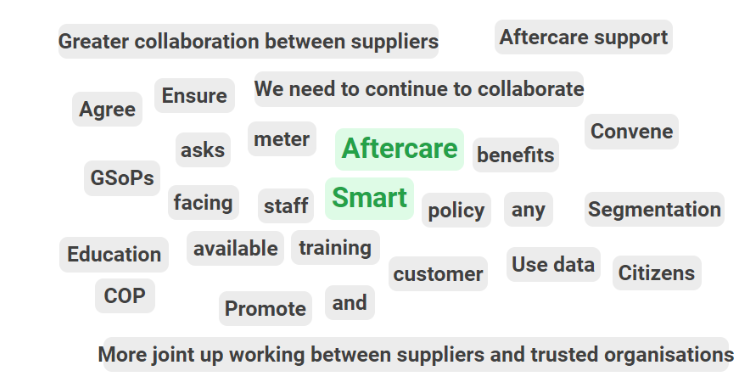Frank discussions and optimism for the future: National Energy Action’s first Smart Meter Symposium

Two weeks ago, stakeholders from across the smart meter rollout came together in London for our first ever Smart Meter Symposium. Across three panels and a workshop, speakers and delegates discussed the benefits of smart meters for low-income and vulnerable households, challenges for the rollout, and what needs to happen going forward. Head of Development Heather Critchlow considers what we learned from the event.
How smart meters can help low-income and vulnerable households
Director of Policy Peter Smith, chairing the first panel session, explained how National Energy Action believes it essential that smart meters benefit vulnerable and low-income households, and do not leave them behind.

The drawbacks of analogue meters are clear for low-income and vulnerable households. Estimated bills on legacy meters cause havoc, with unexpectedly large or incorrect bills putting strain on stretched household budgets. It’s hard to plan a household budget when your energy bills are estimated and has become a much greater issue as energy bills represent a bigger chunk of household outgoings in recent years.
Smart meters help households identify what’s using up energy in their home and make changes accordingly. But National Energy Action doesn’t want households to reduce consumption to the point that it’s dangerous for health or wellbeing. However, being informed of your energy use and having greater visibility will enable householders to be more in control of their bills.
A panellist highlighted another clear advantage of smart meters, citing the heartbreaking case of an 80-year-old woman who died falling off the stepladder she needed to reach to top up her inaccessibly high legacy meter. Smart prepayment meters can be topped up remotely, giving households more flexibility and convenience. Government support, in the form of the Energy Bills Support Scheme (EBSS), was added automatically to smart prepayment meters. Many people with legacy meters missed out on support vouchers which they had to manually obtain and redeem. This saw over £95 million of EBSS vouchers for those on traditional prepayment meters left unclaimed.
Smart meters also provide valuable data for the energy network, and a more responsive grid. However, we need to ensure that the increasing prevalence of time-of-use tariffs doesn’t lead to a two-tier system where low-income households lose out through lack of engagement.
Challenges for the rollout
As Director of Development and Partnerships Danni Barnes pointed out while chairing the second panel, smart meters are only good if all the tech is working correctly. Every negative story about smart meters causes reputational damage to the rollout. SMETS 1 meters losing smart functionality after switching supplier lives long in the memory of many households, with some still thinking that getting a smart meter means you can’t switch supplier. Poor installation and customer service experiences ferment more opposition to the rollout.
Panellists discussed results from a Citizens Advice smart meter customer survey that showed that that 20% of people with a smart meter reported having to regularly give manual meter readings to their supplier. The report also found there was an ‘accountability gap’ between suppliers and the DCC. Who is accountable for smart meter connectivity issues? Households don’t care who is responsible, they just need any problem sorted quickly. Panellists stressed the need for jurisdiction to be clearly defined. Importantly, research has also found that 68% of people with smart meters are happy with them.
As well as genuine issues with smart meters, myths and misconceptions need combatting. Panellists spoke of cases such as a woman believing that getting a smart meter would allow her energy supplier to spy on her through her laptop webcam. Frontline advisers stressed that they need to build trust with clients before broaching the topic of smart meters.

A way forward
The workshop and panel sessions saw healthy discussions around the challenges facing the smart meter rollout, as well as solutions and new perspectives. Our Slido word cloud found aftercare should be a key area of focus for the industry, to help sustain longer-term benefits and consumer engagement. Other focuses and solutions suggested included requirements for private landlords, a ‘refer a friend’ scheme for smart meter installations, better use of smart meter data, and more collaboration between energy suppliers.
The Smart Meter Symposium showed just how passionate the industry is about getting the smart meter rollout right for vulnerable and low-income households. Thanks so much to our speakers, attendees and chairs, as well as staff for organising and helping.

